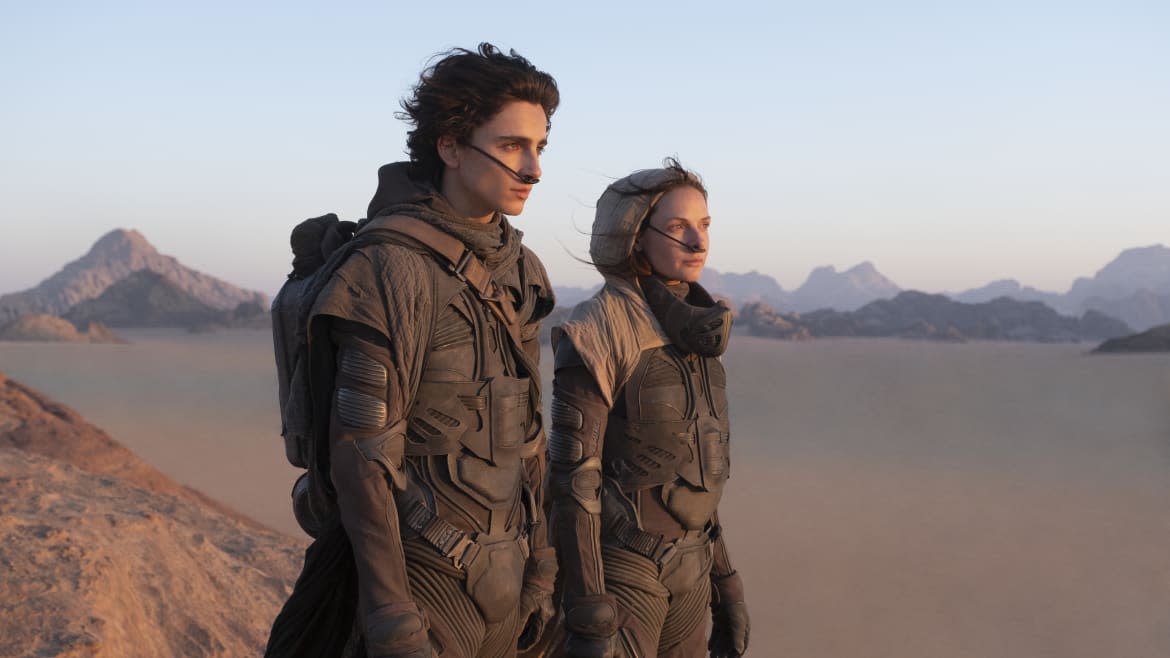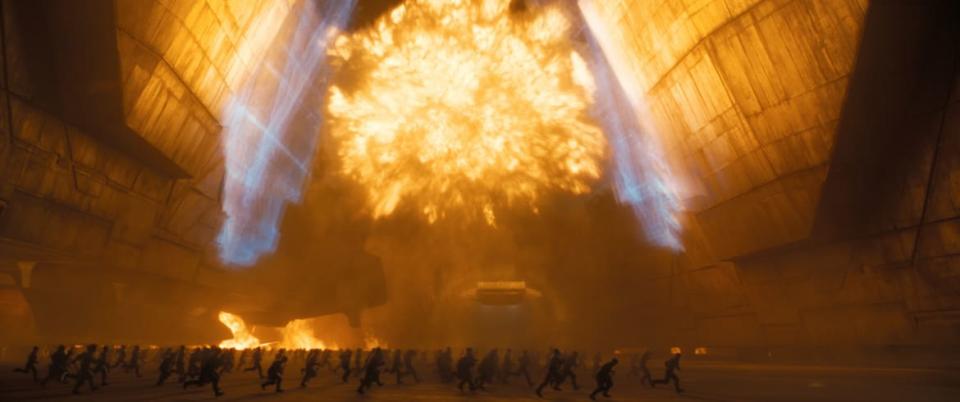‘Dune’ Is an Absolute Marvel—and the Best Sci-Fi Film in Years

- Oops!Something went wrong.Please try again later.
- Oops!Something went wrong.Please try again later.
- Oops!Something went wrong.Please try again later.
- Oops!Something went wrong.Please try again later.
- Oops!Something went wrong.Please try again later.
One could present a compelling argument that Dune, Frank Herbert’s 1965 novel of interplanetary conquest, messianism, and ecological plunder, was the most cursed property in Hollywood.
Since the 1970s, Dune has passed through more hands than a twenty-dollar bill. After David Lean, whose Lawrence of Arabia served as inspiration for Herbert’s desert-set sci-fi saga, passed, the project fell into the hands of Chilean mystic Alejandro Jodorowsky, who envisioned it as his Remembrance of Things Past—a 10-hour epic featuring Orson Welles, Mick Jagger, and Salvador Dali, with music by Pink Floyd. When the financing dried up, Dan O’Bannon, the film’s special effects supervisor, was so distraught (and flat broke) that he had a nervous breakdown, checked into a psychiatric facility, and penned the screenplay to Alien. That film’s director, Ridley Scott, then took a stab at Dune, assembling three drafts of the script over seven months only to abandon it in favor of Blade Runner. Next came David Lynch, who turned down Return of the Jedi to try his hand at the Herbert classic, believing it to be a sort of Star Wars for adults. But meddling by producer Dino De Laurentiis doomed the 1984 picture, which Lynch considers the only “total failure” of his celebrated career.
Dune was thus deemed unfilmable; a Daedalian tangle of ideas too complex for dumbed-down Tinseltown. Until now.
‘Dune’ Director Denis Villeneuve’s Climate Change Warning: ‘Future Generations Will Judge Us’
Denis Villeneuve, the French-Canadian filmmaker that Scott handpicked to direct the sequel to Blade Runner, has finally realized a vision of Dune worthy of its source material. The film, which premiered at the 2021 Venice Film Festival—and hits theaters and HBO Max on Oct. 22—is a transportive journey through space and time that immediately takes its place among the science-fiction cinema greats, and that begs to be seen on as big a screen as possible.
The year is 10,191, and the honorable House Atreides (think: House Stark), led by revered military tactician Duke Leto Atreides (Oscar Isaac), has been granted the power of rule over Arrakis (aka “Dune”), a perilous desert planet rich in “spice”—a glistening natural resource resting in the sand and air that can both power ships for intergalactic travel and extend life (a stand-in for oil and opium). Arrakis had for 80 years been under the draconian rule of House Harkonnen, who made billions mining spice whilst persecuting the Fremen, its native people known for their piercing blue eyes (eat your heart out, Bradley Cooper) and fierce fighting ability. Paul Atreides (Timothee Chalamet), the son of Duke Leto and heir of House Atreides, is haunted by visions of a battlefield riddled with the bloodied bodies of his people, and an enchanting Freman woman (Zendaya) with whom he forges a new path. Oh, and many people are saying that Paul may be the Mahdi, or messiah, owing in part to his divination and swordplay abilities.
Casting Chalamet as the pampered progeny turned reluctant savior (basically Hamlet) is an interesting choice. While the FernGully-haired youngster photographs beautifully and broods with the best of ‘em, his gangly, sylph-like frame doesn’t make him a very convincing warrior, as previously evidenced in The King. Isaac, meanwhile, is pitch-perfect as Duke Leto, a hardened general with a soft spot for his scion, and Jason Momoa brings some much-needed levity to the proceedings as Duncan Idaho, Paul’s mentor and the resident badass of House Atreides.
But the biggest standouts here are the women—most notably Sharon Duncan-Brewster as Dr. Liet-Kynes (gender-swapped from the book), a Fremen ecologist who teaches Paul the importance of seeking harmony with nature, and Rebecca Ferguson’s Lady Jessica, mother to Paul (and mistress of Duke Leto) who belongs to the Bene Gesserit, a sisterhood of women blessed with mind-control capabilities who operate as a realm-altering shadow government. Lady Jessica is the heart and soul of Dune, and Ferguson imbues her with such quiet strength and grace, and is so arresting to watch, that you almost wish it were her origin story. If there’s one award-worthy performance in the film, it’s hers.

Other actors pop up too, among them Josh Brolin’s (square-jawed, yelling) Atreides tough, Javier Bardem as a mysterious Freman leader, a colder-than-ever Charlotte Rampling playing the Reverend Mother of the Bene Gesserit, and Stellan Skarsgard as Baron Vladimir Harkonnen, the gigantic, ruthless, and terribly pasty head of House Harkonnen who can levitate in the air. In films like this, however, the acting runs secondary to the spectacle, and the sheer scale of Villeneuve’s piece—augmented by Hans Zimmer’s booming score—is a wonder to behold. Continuing the brutalist/neo-fascist aesthetic he employed in Blade Runner 2049, Villeneuve has built an elaborate world that is easy to get lost in; one where planes’ wings flap like insects, spacecraft resemble oval-shaped monoliths (as in his previous Arrival), and gargantuan sandworms police the desert. You do, occasionally, wish for a splash of color, though its muted yellow-gray palette is in keeping with a dystopian sandscape.
Stellan Skarsgard Is Finally Seizing the Spotlight
One area of concern lies in Dune’s softening of Herbert’s book’s Islamism. While the cast is far more diverse than Lynch’s Aryan lovefest, there is nary a Middle Eastern actor in sight, and its Islamic influences are relegated to terminology, e.g. “Shai-Hulud,” “Mahdi” and “Lisan al Gaib.” The Fremen too, symbolizing Arab peoples, have been mostly pushed to the background, though will likely factor in more in future installments.
It is not spoiling things to say that House Atreides’ stewardship of Arrakis is short-lived, and, after a stunningly staged siege, Paul and his mother are forced into the desert. Some may take issue with the fact that Dune ends on a cliffhanger—its onscreen title reads Dune: Part One, with two sequels and a Bene Gesserit TV spin-off set to follow (depending, of course, on how well it recoups its $165 million budget). But by the time it arrives, you’ve witnessed such staggering sights and sounds that a pause feels earned.
Got a tip? Send it to The Daily Beast here
Get our top stories in your inbox every day. Sign up now!
Daily Beast Membership: Beast Inside goes deeper on the stories that matter to you. Learn more.
